[click to read]
Wednesday, August 27, 2025
Tuesday, February 1, 2022
WRITER'S JOURNEY: SAMPLER OF MY WORK

In 1852, Frederic Edwin Church painted Virginia's Natural Bridge
My Writing on Historical Architecture
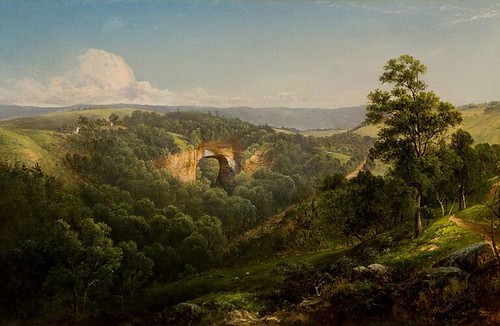
The ‘Most Sublime of Nature’s Works’
[click to read]
One of Virginia’s most amazing architectural treasures wasn't formed by the hand of man at all. (read more)
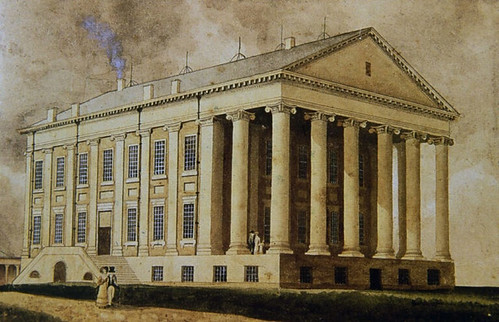
American Classicism and the ‘Gentleman Architect’ Thomas Jefferson
[click to read]
In 1784 Thomas Jefferson found himself in France as our first ambassador. (read more)

An ‘Academical Village’ as a Model for a New Republic
[click to read]
If you had traveled with the Marquis de Lafayette to the Piedmont region of Virginia in 1824... (read more)

Romantic Aspirations, Vision, and Viaducts
[click to read]
Charles Carroll of Carrollton might well have been the Elon Musk of his day. (read more)
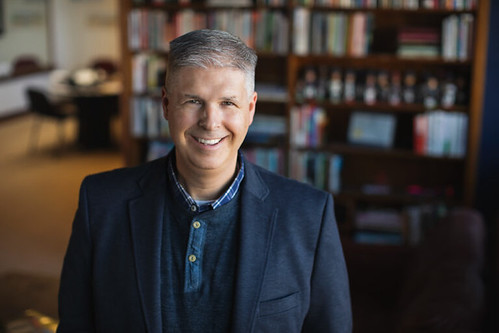
A Conversation With Charles Marohn: ‘Honor the Struggle!’
[click to read]
Walking six blocks to work each morning gives Charles Marohn a unique insight into the vitality of his town. (read more)
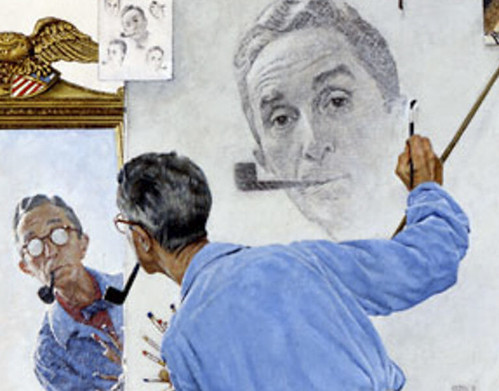
Norman Rockwell’s America
[click to read]
I was showing the America I knew and observed to others who might not have noticed.” —Norman Rockwell (read more)
As seen in American Essence Magazine

A New Day Dawns in Virginia
[click to read]
By nature, parents love their children and feel responsibility for them. Citizens, especially one hopes American citizens, feel entitled to state their grievances. The Declaration of Independence itself contains a list of grievances against the King. The Biden administration reacted to these protests just as King George III reacted against the American colonists in the years leading up to the American Revolution: he called in law enforcement. And the people of Virginia reacted in a way reminiscent of the American colonists: they defeated the candidate for governor who took the position that parents should have nothing to do with their children’s education.”
Thursday, March 18, 2021
Leonardo da Vinci’s Pandemic Inspired Planning

Volume XX, Issue XI: Leonardo da Vinci City Planning
Leonardo da Vinci’s Pandemic Inspired Planning
And How it Might Help Us Today
By Bob Kirchman
In the years 1484 and 1485 the bubonic plague ravaged Milan. Though this was during the Renaissance, the city itself was Medieval in its plan with narrow streets crowded with a hodgepodge of shops, houses and other essential buildings. Sanitation was terrible and sunlight often never penetrated the narrow streets. The great Renaissance polymath saw this as a breeding ground for pestilence, and so he set to work to create a better city. In his notebooks he drew an open plan with wide spaces and canals – open to sunlight and with separation between passageways for freight and refuse and those for pedestrians. It was a first step towards modern city planning. (read more)
Monday, September 7, 2020
The Flight of the Phoenix Election

Volume XIX, Issue Vb:The “Flight of the Phoenix Election,”
The Flight of the Phoenix Election
[click to read]
By Bob Kirchman
In the last election, an article appeared comparing the urgency of the election to the situation facing the passengers on flight 93 on September 11, 2001. [1.] It’s then anonymous author, ‘Publicus,’ made a great point. Too often Conservatives approached the dangers facing the republic with not enough of a sense of urgency. The 2016 election was indeed of grave importance. But now it is 2020 and the urgency of the situation has only become more pronounced. After the country seemed to be taking a better course the pandemic and civil unrest threw sand in the engine of recovery. Here we are, much like the cast of Flight of the Phoenix, stuck in a bad place.(read more)
Tuesday, April 2, 2019
Virginia's Eugenics Legacy, Unplanned Movie
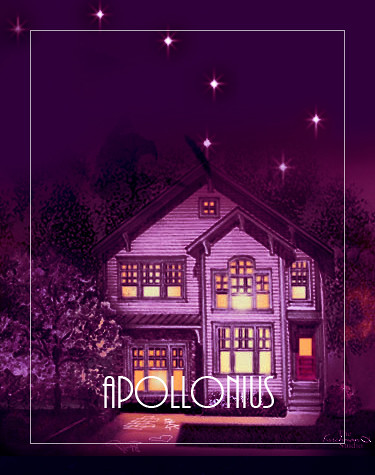
Volume XIV, Issue XIII
Apollonius
By Bob Kirchman
Copyright © 2019, The Kirchman Studio, all rights reserved
Chapter 13: The Long Road Home
A new crater now scarred the Martian surface. The colony was gone! In the shadow of some rock formations there remained some greenhouses and solar panels but it was clear that the missile intended for Great Northern had fallen and detonated so as to kill the colonists instead. Sarah wiped her eyes frequently as she manned scanning equipment. “Had ANYONE survived?” she wondered. But if they did, what would become of them. All of the landing craft appeared to have been destroyed along with the colony and as this was a contingency unforeseen, there was no landing craft left with the Great Northern capable of going to the planet’s surface and returning. If indeed anyone had survived the blast they would be marooned. It would be two years before Great Northern could return and if a smaller craft were readied it would probably take six months to do so. Sarah anxiously scanned the surface each time the ship orbited above. Nothing! No sign of life appeared. No radio call for help ever came. The radiation readings from the planet suggested there would be little chance of survival anyway. Finally, with great regret, Ben-Gurion gave orders to burn the main engine and insert Great Northern into Earth Return Trajectory. It was a lonely feeling as the craft slowly gained escape momentum. Sarah was reminded of a similar moment portrayed in the movie version of an old James Michener novel where an apocryphal Apollo 18’s lunar lander crashed into the lunar surface and the command module pilot returned to Earth alone as James Taylor’s “Sweet Baby James” played as background music. In reality the lunar program had ended with Apollo 17 and LEM pilot Gene Cernan, aware of the risky nature of this craft, uttered the last words spoken from the surface of the moon: “Let’s get this mother out of here.”
If the truth be known, Abiyah Ben-Gurian must have said something similar as he eased the starship out of orbit. Only his wife knows what he said though. In communication with Earth he was cool and emotionless… but his eyes flowed with the emotion his voice covered. Sarah and Abiyah could read each other’s subtle voice inflections and facial expressions. They mourned together unashamedly.
Although their communications with Earth were crisp and professional, life aboard Great Northern eased into a relaxed sort of waiting. Sarah’s female colleagues surprised her with a baby shower and their inventiveness in creating infant clothing and toys from space supplies knew no boundaries. The good doctor moved out of the crew quarters so a nursery would be created. All would be found out upon return docking anyway so the sparse cabin became a study in pink and blue. Major Johnson even painted a little mural of children running and doing cartwheels under an apple tree as birds flew overhead. The good doctor started experimenting with a concoction of a sort of formula made from space foods should it become necessary. The due date approached as the ship traveled along the free return trajectory. Abiyah and Sarah actually enjoyed the suspense of not knowing the gender of their baby. Then one day Sarah, after a long and difficult labor, laid eyes on her son! The boy was a good nurser and the formula concoction was not needed. The two decisive pilots had discussed names, but now they gave themselves the luxury of time in deciding what to call him. Abiyah even jokingly assigned him a number but his wife ended that with one look. Now the crew flowed in the sequence of tasks necessary to begin braking into the same orbit they had left from. ‘Katherine,” their faithful trajectory computer whirred and spit out instructions to the retro engines. Soon the great mission to Mars would be over. Debriefing was planned to take place at Cape Lisbon and extended debriefing would occur at the town of Shalom inside the biosphere complex at Big Diomede. This would provide the astronauts with some privacy as they tried to make the transition back to Earth life. No doubt, there would be ticker tape parades and tours to be done but that could wait. A fairly curt press release would suffice for now.
After Apollo 11 returned from the moon, the press became bored with space exploration and did not even bother to cover the shuttle missions. They remained in this frame of mind until two shuttles were destroyed in terrible accidents and then they pretty much lobbied the shuttle program out of existence. Cape Lisbon’s linear induction launcher marked the true beginning of regular and safe transfer to orbit even though its Northern location meant that the heavy unmanned payloads and parts of space stations were still delivered by large boosters from launch sites closer to the Equator. Being sequestered on Big Diomede would give the astronauts time to think. Book contacts were already put forth and the crew would be hard at work for the next year to meet them. Sarah wondered to herself about the change. Abiyah would not take well to retirement. She was now taking on motherhood with the same energy she had poured into her work as a pilot and astronaut. What bothered her was the probability that once they stepped out of the biosphere they would be living in a fishbowl.
The Lindberghs could travel in the end and get away from it all for at least a while. Anne was able to raise five children. I just don’t see how though.” Sarah opined.
Ben Gurion thought for a minute: “The only thing left for us really is to somehow find a way to quietly pass along the things we’ve learned. Please note my emphasis on QUIETLY, if you will dearest.”
I sure don’t want to end up in some walled compound full of diplomats!” Sarah answered. “I do think there is a place where we might be useful, but not on public display.”
Sarah was ambivalent, however, about the possibility of assignment to Cape Lisbon, though that was certainly isolated. She had a child now and that changed her desires as to where she would live. Childless, she would probably not have thought twice about herself and her husband joining the ‘Baltimore Gun Club,’[1.] as the linear induction launch team called themselves. This was not a reference to their love of outdoor sports. The name came from Jules Verne’s novel ‘From the Earth to the Moon’[2.] [3.] and it referred to the munitions experts who built the large cannon from which Verne’s fictional spacecraft was launched. The Cape Lisbon team lived in a fairly austere environment. “No place to raise a child,” she mused to herself.
Between the little college with the community church and parsonage and the Zimmerman family compound there were some as yet unoccupied faculty houses for the college. Here the astronauts were to finalize their debriefing and writing. Ben-Gurion and his wife were given the one closest to the college where they would have access to people and resources as they finished their work. Sarah carried her infant son into the garden to calm his crying one afternoon. She was at first startled when a lady filling her hummingbird feeder with clear nectar looked up and saw her from the adjoining yard. “May I try holding the little fellow?” the neighbor asked… “Oh, please excuse the paint on my hands… I assure you it is dry and nursery-safe non-toxic. Mural painting today, if you must know”
And so, the copilot of the Great Northern happily surveyed a little place with very down to earth beauty and simplicity and thought: “I think I might just like it here.”
(to be continued)

The Spirit of Saint Louis
Lindbergh's Transatlantic Flight
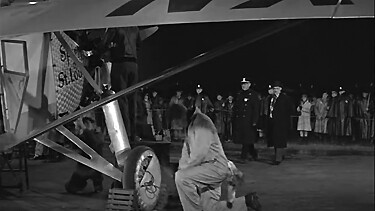
Watch: The Spirit of Saint Louis [click to watch]
When I was a boy, I remember reading Charles Lindbergh’s The Spirit of Saint Louis. It is a hopeful book and sets a young person to thinking about his or her own goals and aspirations. We watched men go to the moon. Amazing achievements, rooted in IMAGO DEI – our creation in the Divine Image, served to inspire us. Sadly, we’ve lost that part of the great story. At the end of today’s issue John Stonestreet will talk about the message young people often hear today. Nihilism has replaced the optimism that characterized the fiction of our day.
For our part, I believe people of Faith have been all too quick to accept the pessimism of our day. We look forward to future bliss, but forget that the Divine promises to restore all things and that our labor in the Lord is not in vain. We forget that our inventiveness is part of the Salvation message. We are made in the Divine Image. That includes the creative spark that drives us to invent new technologies and solve problems. It makes us work to fight starvation and dig wells. It leads us to do great things.
To be sure, it can be overworked into pride and arrogance, but in that regard it is like any good thing pushed to excess. I once read a Christian book where the author said that primitive societies were ‘better’ because people were not pushed as they are in Western society. They had more time for family and contemplation the author continued. The more I pondered the author’s point, the more I wondered: “has he actually LIVED in such a culture?” As a Western missionary, he had indeed inserted himself into such a place but it was clear that he was a visitor and his Western support gave him the leisure to enjoy it.
Had he truly lived as one of such a culture, he would have seen the reality of a failed hunt and hungry children. He would have known the pain of infant mortality, often caused by contaminated water that a modern well would have eliminated. He might have experienced the terror of tribal war. In the end I determined that I was happier with the ‘problems’ of my own culture. I bring this story up merely to point out that we may not truly appreciate much of what inspiration has done to enrich our own lives. If we do not appreciate it, we probably do not pass the baton to our children.
We as a people need a good shot of hope. An honest study of our history might just give us more of that than we might imagine. In light of the latest acts of evil in our world, the need to teach hope and goodness is imperative! To that end I present the stories that I do.
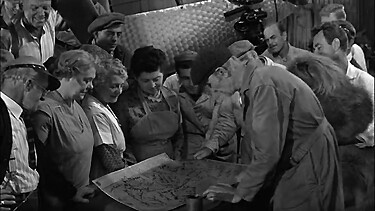
In the 1957 film, The Spirit of Saint Louis, Ryan Aircraft employees are depicted signing the cowling.

Leaves in a stream, Shenandoah National Park.
Photo by Bob Kirchman.
Seven Days
Photos by Bob Kirchman

Summer.
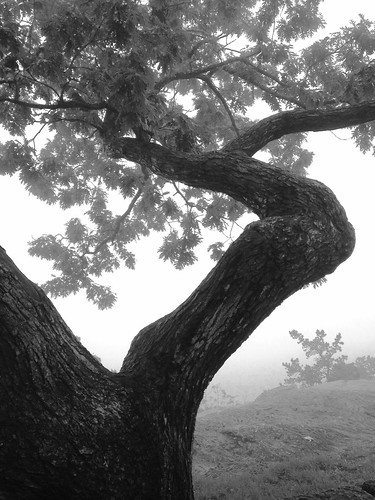
Autumn.
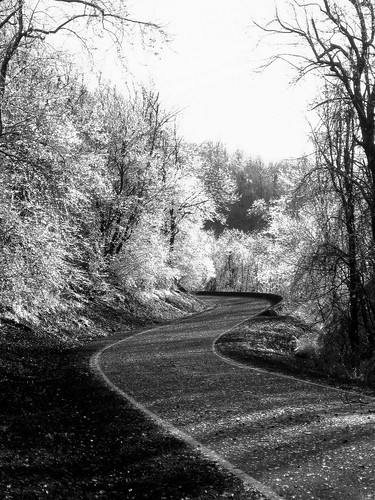
Winter.
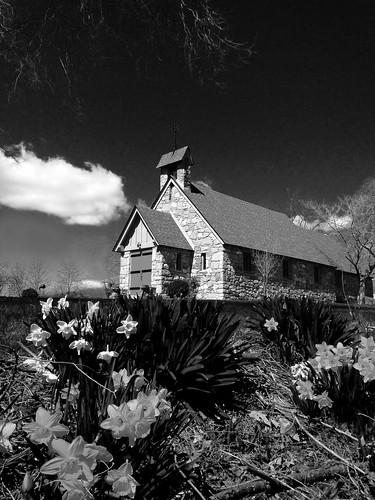
Spring.
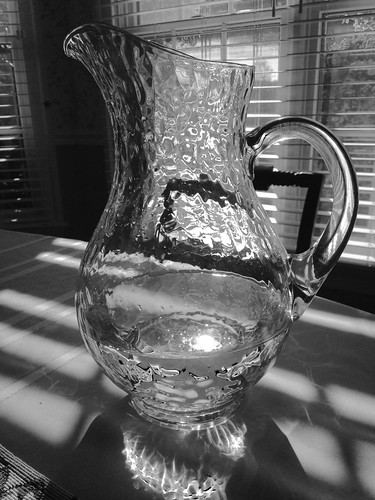
Summer.
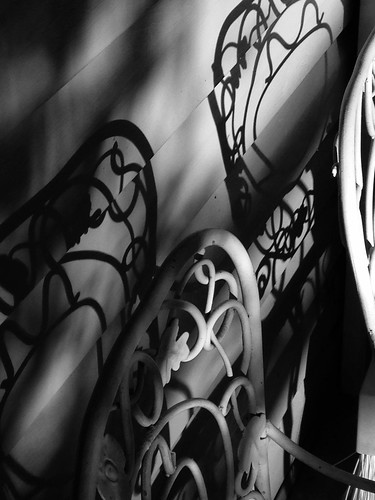
Autumn.
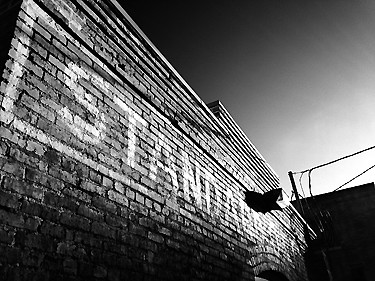
Winter.
I think the thrill of the Pagan stories and of romance may be due to the fact that they are mere beginnings—the first, faint whisper of the wind from beyond the world—while Christianity is the thing itself: and no thing, when you have really started on it, can have for you then and there just the same thrill as the first hint. For example, the experience of being married and bringing up a family cannot have the old bittersweet of first falling in love. But it is futile (and, I think, wicked) to go on trying to get the old thrill again: you must go forward and not backward. Any real advance will in its turn be ushered in by a new thrill, different from the old: doomed in its turn to disappear and to become in its turn a temptation to retrogression. Delight is a bell that rings as you set your foot on the first step of a new flight of stairs leading upwards. Once you have started climbing you will notice only the hard work: it is when you have reached the landing and catch sight of the new stair that you may expect the bell again. This is only an idea, and may be all rot: but it seems to fit in pretty well with the general law (thrills also must die to live) of autumn and spring, sleep and waking, death and resurrection, and ‘Whosoever loseth his life, shall save it.‘” – C. S. Lewis, Collected Letters
We are, not metaphorically but in very truth, a Divine work of art, something that God is making, and therefore something with which He will not be satisfied until it has a certain character. Here again we come up against what I have called the “intolerable compliment.” Over a sketch made idly to amuse a child, an artist may not take much trouble: he may be content to let it go even though it is not exactly as he meant it to be. But over the great picture of his life—the work which he loves, though in a different fashion, as intensely as a man loves a woman or a mother a child—he will take endless trouble—and would doubtless, thereby give endless trouble to the picture if it were sentient. One can imagine a sentient picture, after being rubbed and scraped and re-commenced for the tenth time, wishing that it were only a thumb-nail sketch whose making was over in a minute. In the same way, it is natural for us to wish that God had designed for us a less glorious and less arduous destiny; but then we are wishing not for more love but for less.” ― C.S. Lewis, The Problem of Pain
The problem of reconciling human suffering with the existence of a God who loves, is only insoluble so long as we attach a trivial meaning to the word "love", and look on things as if man were the centre of them. Man is not the centre. God does not exist for the sake of man. Man does not exist for his own sake. "Thou hast created all things, and for thy pleasure they are and were created." We were made not primarily that we may love God (though we were made for that too) but that God may love us, that we may become objects in which the divine love may rest "well pleased".” ― C.S. Lewis, The Problem of Pain
From Dystopia to Nihilism
Literature Aimed at Young Adults Promotes Despair
[click to read]
by: John Stonestreet and Roberto Rivera
What are your teens reading these days? You really should find out. Especially if they’re into the newest trend in young adult fiction.
For the first decade or so of the 21st century, the hottest trend in young adult fiction was dystopian novels. Book series like “The Hunger Games,” “The Maze Runner,” and “Divergent” sold tens of millions of copies, were turned into successful film franchises, and spawned so many imitators that the genre became, as Vox.com put it, a “cliché.”
While there are still plenty of young adult dystopias being written, a new genre seems to be emerging—one that will make us look back on the young adult dystopia boom as the “good old days.”
That genre is teen suicide.
In a recent article in Vox, Constance Grady pointed out that young adult dystopias have been “a license to print money” for publishers. Though there are many theories about why the genre exploded, virtually everyone agrees that the popularity of the books, like pop culture in general, reflects the readers’ concerns and moods. [read more]
The Church Resilient
Why Church Shootings Don't Intimidate
[click to read]
By Russell Moore
Eternal life cannot be overcome by death. And over that church will be a cross." [read more] ht/M. K. Hand
An ordinary simple Christian kneels down to say his prayers. He is trying to get into touch with God. But if he is a Christian he knows that what is prompting him to pray is also God: God, so to speak, inside him. But he also knows that all his real knowledge of God comes through Christ, the Man who was God—that Christ is standing beside him, helping him to pray, praying for him. You see what is happening. God is the thing to which he is praying—the goal he is trying to reach. God is also the thing inside him which is pushing him on—the motive power. God is also the road or bridge along which he is being pushed to that goal. So that the whole threefold life of the three-personal Being is actually going on in that ordinary little bed- room where an ordinary man is saying his prayers. The man is being caught up into the higher kinds of life—what I called Zoe or spiritual life: he is being pulled into God, by God, while still remaining himself.” – C. S. Lewis, Mere Christianity
Citizen Journalism with a Better Flavor

Volume XVI, Issue XIIIa
Phantasies
By George Macdonald, Chapter 22
No one has my form but the I."
~ Schoppe, in Jean Pau's "Titan".
Joy's a subtil elf.
I think man's happiest when he forgets himself."
~ Cyril Tourneur, "The Revenger's Tragedy".
On the third day of my journey, I was riding gently along a road, apparently little frequented, to judge from the grass that grew upon it. I was approaching a forest. Everywhere in Fairy Land forests are the places where one may most certainly expect adventures. As I drew near, a youth, unarmed, gentle, and beautiful, who had just cut a branch from a yew growing on the skirts of the wood, evidently to make himself a bow, met me, and thus accosted me:
Sir knight, be careful as thou ridest through this forest; for it is said to be strangely enchanted, in a sort which even those who have been witnesses of its enchantment can hardly describe."
I thanked him for his advice, which I promised to follow, and rode on. But the moment I entered the wood, it seemed to me that, if enchantment there was, it must be of a good kind; for the Shadow, which had been more than usually dark and distressing, since I had set out on this journey, suddenly disappeared. I felt a wonderful elevation of spirits, and began to reflect on my past life, and especially on my combat with the giants, with such satisfaction, that I had actually to remind myself, that I had only killed one of them; and that, but for the brothers, I should never have had the idea of attacking them, not to mention the smallest power of standing to it. Still I rejoiced, and counted myself amongst the glorious knights of old; having even the unspeakable presumption--my shame and self- condemnation at the memory of it are such, that I write it as the only and sorest penance I can perform--to think of myself (will the world believe it?) as side by side with Sir Galahad! Scarcely had the thought been born in my mind, when, approaching me from the left, through the trees, I espied a resplendent knight, of mighty size, whose armour seemed to shine of itself, without the sun. When he drew near, I was astonished to see that this armour was like my own; nay, I could trace, line for line, the correspondence of the inlaid silver to the device on my own. His horse, too, was like mine in colour, form, and motion; save that, like his rider, he was greater and fiercer than his counterpart. The knight rode with beaver up. As he halted right opposite to me in the narrow path, barring my way, I saw the reflection of my countenance in the centre plate of shining steel on his breastplate. Above it rose the same face--his face--only, as I have said, larger and fiercer. I was bewildered. I could not help feeling some admiration of him, but it was mingled with a dim conviction that he was evil, and that I ought to fight with him.
Let me pass," I said.
When I will," he replied.
Something within me said: "Spear in rest, and ride at him! else thou art for ever a slave."
I tried, but my arm trembled so much, that I could not couch my lance. To tell the truth, I, who had overcome the giant, shook like a coward before this knight. He gave a scornful laugh, that echoed through the wood, turned his horse, and said, without looking round, "Follow me."
I obeyed, abashed and stupefied. How long he led, and how long I followed, I cannot tell. "I never knew misery before," I said to myself. "Would that I had at least struck him, and had had my death-blow in return! Why, then, do I not call to him to wheel and defend himself? Alas! I know not why, but I cannot. One look from him would cow me like a beaten hound." I followed, and was silent.
At length we came to a dreary square tower, in the middle of a dense forest. It looked as if scarce a tree had been cut down to make room for it. Across the very door, diagonally, grew the stem of a tree, so large that there was just room to squeeze past it in order to enter. One miserable square hole in the roof was the only visible suggestion of a window. Turret or battlement, or projecting masonry of any kind, it had none. Clear and smooth and massy, it rose from its base, and ended with a line straight and unbroken. The roof, carried to a centre from each of the four walls, rose slightly to the point where the rafters met. Round the base lay several little heaps of either bits of broken branches, withered and peeled, or half-whitened bones; I could not distinguish which. As I approached, the ground sounded hollow beneath my horse's hoofs. The knight took a great key from his pocket, and reaching past the stem of the tree, with some difficulty opened the door. "Dismount," he commanded. I obeyed. He turned my horse's head away from the tower, gave him a terrible blow with the flat side of his sword, and sent him madly tearing through the forest.
Now," said he, "enter, and take your companion with you."
I looked round: knight and horse had vanished, and behind me lay the horrible shadow. I entered, for I could not help myself; and the shadow followed me. I had a terrible conviction that the knight and he were one. The door closed behind me.
Now I was indeed in pitiful plight. There was literally nothing in the tower but my shadow and me. The walls rose right up to the roof; in which, as I had seen from without, there was one little square opening. This I now knew to be the only window the tower possessed. I sat down on the floor, in listless wretchedness. I think I must have fallen asleep, and have slept for hours; for I suddenly became aware of existence, in observing that the moon was shining through the hole in the roof. As she rose higher and higher, her light crept down the wall over me, till at last it shone right upon my head. Instantaneously the walls of the tower seemed to vanish away like a mist. I sat beneath a beech, on the edge of a forest, and the open country lay, in the moonlight, for miles and miles around me, spotted with glimmering houses and spires and towers. I thought with myself, "Oh, joy! it was only a dream; the horrible narrow waste is gone, and I wake beneath a beech-tree, perhaps one that loves me, and I can go where I will." I rose, as I thought, and walked about, and did what I would, but ever kept near the tree; for always, and, of course, since my meeting with the woman of the beech-tree far more than ever, I loved that tree. So the night wore on. I waited for the sun to rise, before I could venture to renew my journey. But as soon as the first faint light of the dawn appeared, instead of shining upon me from the eye of the morning, it stole like a fainting ghost through the little square hole above my head; and the walls came out as the light grew, and the glorious night was swallowed up of the hateful day. The long dreary day passed. My shadow lay black on the floor. I felt no hunger, no need of food. The night came. The moon shone. I watched her light slowly descending the wall, as I might have watched, adown the sky, the long, swift approach of a helping angel. Her rays touched me, and I was free. Thus night after night passed away. I should have died but for this. Every night the conviction returned, that I was free. Every morning I sat wretchedly disconsolate. At length, when the course of the moon no longer permitted her beams to touch me, the night was dreary as the day.
When I slept, I was somewhat consoled by my dreams; but all the time I dreamed, I knew that I was only dreaming. But one night, at length, the moon, a mere shred of pallor, scattered a few thin ghostly rays upon me; and I think I fell asleep and dreamed. I sat in an autumn night before the vintage, on a hill overlooking my own castle. My heart sprang with joy. Oh, to be a child again, innocent, fearless, without shame or desire! I walked down to the castle. All were in consternation at my absence. My sisters were weeping for my loss. They sprang up and clung to me, with incoherent cries, as I entered. My old friends came flocking round me. A gray light shone on the roof of the hall. It was the light of the dawn shining through the square window of my tower. More earnestly than ever, I longed for freedom after this dream; more drearily than ever, crept on the next wretched day. I measured by the sunbeams, caught through the little window in the trap of my tower, how it went by, waiting only for the dreams of the night.
About noon, I started as if something foreign to all my senses and all my experience, had suddenly invaded me; yet it was only the voice of a woman singing. My whole frame quivered with joy, surprise, and the sensation of the unforeseen. Like a living soul, like an incarnation of Nature, the song entered my prison-house. Each tone folded its wings, and laid itself, like a caressing bird, upon my heart. It bathed me like a sea; inwrapt me like an odorous vapour; entered my soul like a long draught of clear spring-water; shone upon me like essential sunlight; soothed me like a mother's voice and hand. Yet, as the clearest forest-well tastes sometimes of the bitterness of decayed leaves, so to my weary, prisoned heart, its cheerfulness had a sting of cold, and its tenderness unmanned me with the faintness of long-departed joys. I wept half-bitterly, half-luxuriously; but not long. I dashed away the tears, ashamed of a weakness which I thought I had abandoned. Ere I knew, I had walked to the door, and seated myself with my ears against it, in order to catch every syllable of the revelation from the unseen outer world. And now I heard each word distinctly. The singer seemed to be standing or sitting near the tower, for the sounds indicated no change of place. The song was something like this:
The sun, like a golden knot on high,
Gathers the glories of the sky,
And binds them into a shining tent,
Roofing the world with the firmament.
And through the pavilion the rich winds blow,
And through the pavilion the waters go.
And the birds for joy, and the trees for prayer,
Bowing their heads in the sunny air,
And for thoughts, the gently talking springs,
That come from the centre with secret things--
All make a music, gentle and strong,
Bound by the heart into one sweet song.
And amidst them all, the mother Earth
Sits with the children of her birth;
She tendeth them all, as a mother hen
Her little ones round her, twelve or ten:
Oft she sitteth, with hands on knee,
Idle with love for her family.
Go forth to her from the dark and the dust,
And weep beside her, if weep thou must;
If she may not hold thee to her breast,
Like a weary infant, that cries for rest
At least she will press thee to her knee,
And tell a low, sweet tale to thee,
Till the hue to thy cheeky and the light to thine eye,
Strength to thy limbs, and courage high
To thy fainting heart, return amain,
And away to work thou goest again.
From the narrow desert, O man of pride,
Come into the house, so high and wide.
Hardly knowing what I did, I opened the door. Why had I not done so before? I do not know.
At first I could see no one; but when I had forced myself past the tree which grew across the entrance, I saw, seated on the ground, and leaning against the tree, with her back to my prison, a beautiful woman. Her countenance seemed known to me, and yet unknown. She looked at me and smiled, when I made my appearance.
Ah! were you the prisoner there? I am very glad I have wiled you out."
Do you know me then?"
Do you not know me? But you hurt me, and that, I suppose, makes it easy for a man to forget. You broke my globe. Yet I thank you. Perhaps I owe you many thanks for breaking it. I took the pieces, all black, and wet with crying over them, to the Fairy Queen. There was no music and no light in them now. But she took them from me, and laid them aside; and made me go to sleep in a great hall of white, with black pillars, and many red curtains. When I woke in the morning, I went to her, hoping to have my globe again, whole and sound; but she sent me away without it, and I have not seen it since. Nor do I care for it now. I have something so much better. I do not need the globe to play to me; for I can sing. I could not sing at all before. Now I go about everywhere through Fairy Land, singing till my heart is like to break, just like my globe, for very joy at my own songs. And wherever I go, my songs do good, and deliver people. And now I have delivered you, and I am so happy."
She ceased, and the tears came into her eyes.
All this time, I had been gazing at her; and now fully recognised the face of the child, glorified in the countenance of the woman.
I was ashamed and humbled before her; but a great weight was lifted from my thoughts. I knelt before her, and thanked her, and begged her to forgive me.
Rise, rise," she said; "I have nothing to forgive; I thank you. But now I must be gone, for I do not know how many may be waiting for me, here and there, through the dark forests; and they cannot come out till I come."
She rose, and with a smile and a farewell, turned and left me. I dared not ask her to stay; in fact, I could hardly speak to her. Between her and me, there was a great gulf. She was uplifted, by sorrow and well-doing, into a region I could hardly hope ever to enter. I watched her departure, as one watches a sunset. She went like a radiance through the dark wood, which was henceforth bright to me, from simply knowing that such a creature was in it.
She was bearing the sun to the unsunned spots. The light and the music of her broken globe were now in her heart and her brain. As she went, she sang; and I caught these few words of her song; and the tones seemed to linger and wind about the trees after she had disappeared:
Thou goest thine, and I go mine--
Many ways we wend;
Many days, and many ways,
Ending in one end.
Many a wrong, and its curing song;
Many a road, and many an inn;
Room to roam, but only one home
For all the world to win.
And so she vanished. With a sad heart, soothed by humility, and the knowledge of her peace and gladness, I bethought me what now I should do. First, I must leave the tower far behind me, lest, in some evil moment, I might be once more caged within its horrible walls. But it was ill walking in my heavy armour; and besides I had now no right to the golden spurs and the resplendent mail, fitly dulled with long neglect. I might do for a squire; but I honoured knighthood too highly, to call myself any longer one of the noble brotherhood. I stripped off all my armour, piled it under the tree, just where the lady had been seated, and took my unknown way, eastward through the woods. Of all my weapons, I carried only a short axe in my hand.
Then first I knew the delight of being lowly; of saying to myself, "I am what I am, nothing more." "I have failed," I said, "I have lost myself--would it had been my shadow." I looked round: the shadow was nowhere to be seen. Ere long, I learned that it was not myself, but only my shadow, that I had lost. I learned that it is better, a thousand-fold, for a proud man to fall and be humbled, than to hold up his head in his pride and fancied innocence. I learned that he that will be a hero, will barely be a man; that he that will be nothing but a doer of his work, is sure of his manhood. In nothing was my ideal lowered, or dimmed, or grown less precious; I only saw it too plainly, to set myself for a moment beside it. Indeed, my ideal soon became my life; whereas, formerly, my life had consisted in a vain attempt to behold, if not my ideal in myself, at least myself in my ideal. Now, however, I took, at first, what perhaps was a mistaken pleasure, in despising and degrading myself. Another self seemed to arise, like a white spirit from a dead man, from the dumb and trampled self of the past. Doubtless, this self must again die and be buried, and again, from its tomb, spring a winged child; but of this my history as yet bears not the record.
Self will come to life even in the slaying of self; but there is ever something deeper and stronger than it, which will emerge at last from the unknown abysses of the soul: will it be as a solemn gloom, burning with eyes? or a clear morning after the rain? or a smiling child, that finds itself nowhere, and everywhere?
(to be continued)
Stones of Remembrance
Short Story by Bob Kirchman
Did I ever tell you the story about my Great Grandfather?” Rupert Zimmerman said casually to Pastor Jon Greene as they sat in Green’s office in the little chapel on Big Diomede.
The two often talked regularly now after the events on the great Bering Strait Bridge that had taken a driver’s life and had cemented Zimmerman’s decision to put his faith in one far greater than himself. The way the story was often retold by Zimmerman’s descendants, the transformation had been a complete and sudden one. Again, the real story moves a lot slower. Zimmerman himself had moved on from frequent dinner guest to disciple. In Jon Greene’s wildest dreams he never thought that the business of multiplying faithful followers of Jesus Christ would include the ruthless builder of bridges, but that it did. Healing Zimmerman’s war wounds took a long time. The battle of Anchorage and a kidnapping on the Taiga had left raw open wounds in the man that Zimmerman himself thought impossible to heal.
But at Greene’s insistence, Rupert opened doors he feared to open. It was there that he met his own Great Grandfather who would become a part of his own journey.
My Great Grandfather Tolbert Saunders Dalton was born in Robertson County, Tennessee, close to Nashville. He was seventeen When the War between the States started. He joined the 49th Regiment of Tennessee Volunteers and had a long and distinguished career as a soldier. He saw many battles, some of them quite fierce, and the sight and sound of men dying around him led him to preach the Gospel. By the light of many a campfire, my Great Grandfather shared the simple message of redemption in Christ.
He served under General Nathan B. Forrest and saw action in some of the battles for control of the Mississippi. When Union troops advanced on Memphis, preparing to attack at dawn the next day, General Forrest was outnumbered ten to one. He did not have the artillery to protect the city, but he did have at his disposal a fair number of farm wagons and many willing workers like young Dalton, who had lied about his age to join the army. All night long, the boys hollowed out the ends of tree trunks and blacked them to look like cannon. Then each ‘cannon’ was positioned on a set of wagon wheels. The faux cannon were positioned for maximum effect along the banks of the river and then General Forrest demanded surrender! In a dangerous bluff Forrest’s 300 men captured 3,000 would-be attackers.
Tolbert Dalton was later assigned to spy duty. He once carried a message to General Forrest through enemy lines by pretending to be a deaf and dumb farm boy. Seeing an unexpected checkpoint, he quickly stuffed the message in his mouth and made signs to the soldiers. He was quick-minded enough to sign for clarification when one of the soldiers said “go ahead.”
Wounded in action, Dalton spent several months out of action and then joined the Seventh Kentucky Volunteers. In one battle the flag was shot down and young Tolbert rose to replant it in the breastworks. When it was shot down again, Dalton rallied the troops by standing to hold the flag in place. Enemy fire ripped his shirt but miraculously he was unscathed. His courage under fire earned him the rank of Major. The experience affirmed G-d’s calling in the young soldier’s heart. When the war was over, Dalton went to Medical School and became a doctor but the needs of men’s souls called him to the work that had begun around the campfires of his regiment. Preaching became Dalton’s sole vocation and he eventually settled in the town of Stanley in Page County, Virginia. One of my most treasured possessions is a copy of Wilmore’s New Analytical Reference Bible that my Grandfather once used.
I kept it solely as a connection point to my past, but after my discipleship began, it became so much more. After the war, Dalton sought to bind the nation’s wounds, but his journey took him beyond physical healing to the spiritual. Reading his war experiences and his subsequent “Life and Labors of a Poor Sinner,” I saw how his Citizenship had been transferred again. He was now not longer a Tennessean or a Virginian, or a Confederate, but a man of the Kingdom of Heaven. That is what propelled the best season of the man’s life.
But there was more to Dalton’s life than one might imagine. He became a minister of G-d and raised eight children! Probably the most interesting of these was his son, Tolbert Percy Dalton, known as ‘Jack’ who played professional baseball in Detroit from 1910 to 1916. He mysteriously vanished on July 4, 1948, from Catonsville, Maryland, while walking to a church service. Speculation abounded as to what happened to him. We all suspected that he had gone to Alaska to seek his fortune or something like that. “G-d has no Grandchildren,” and I suspect it was too much to follow in the old man’s footsteps. Years later we learned that he had died of a heart attack in Pittsburgh, Pennsylvania two years after he disappeared.” Rupert went on to examine how a life that G-d used was not always something that read as a beautiful novel. Life did not always make sense… but the comfort was always that there was more to life… always, than what you could see.
It was growing late. The work of two great bridge builders pressed upon them. The man who brought together continents embraced the man who brought together men and the Kingdom. The conversation would be continued.
Transformation
A powerful scene alludes to an even more powerful reality.
The Doctor: Between you and me, in a hundred words, where do you think Van Gogh rates in the history of art?
Curator: Well... um... big question, but, to me Van Gogh is the finest painter of them all. Certainly the most popular, great painter of all time. The most beloved, his command of colour most magnificent. He transformed the pain of his tormented life into ecstatic beauty. Pain is easy to portray, but to use your passion and pain to portray the ecstasy and joy and magnificence of our world, no one had ever done it before. Perhaps no one ever will again. To my mind, that strange, wild man who roamed the fields of Provence was not only the world's greatest artist, but also one of the greatest men who ever lived.
*****
And I heard a great voice out of heaven saying, Behold, the tabernacle of God is with men, and he will dwell with them, and they shall be his people, and God himself shall be with them, and be their God.
And God shall wipe away all tears from their eyes; and there shall be no more death, neither sorrow, nor crying, neither shall there be any more pain: for the former things are passed away.
And he that sat upon the throne said, Behold, I make all things new. And he said unto me, Write: for these words are true and faithful.”
-- Revelation 21:3-5
Worldview is everything. In Christ we have the one who actually transforms the pain and torment of this life into something beautiful. Here is a great truth that is beyond our understanding, yet the Divine Himself is the Master who completes the tapestries of our lives… inverting them to reveal His beautiful hand. This is a beautiful story, but may I suggest that it is beautiful because we yearn for what the Doctor and Amy were able to show Vincent and it is beautiful because Christ promises to show us the same. From C. S. Lewis and George MacDonald we learn that great story conveys great truth. Lewis shows us that those longings in us that this world cannot fulfill point to the fact that we were created for a better world.
History is not quite kind to Van Gogh, in fact the brief version often leaves you the memory of his madness. Yet here are some thoughts from the man himself. I think he is worthy of some study:
I feel that there is nothing more truly artistic than to love people.”
If you hear a voice within you say 'you cannot paint,' then by all means paint, and that voice will be silenced.”
Love many things, for therein lies the true strength, and whosoever loves much performs much, and can accomplish much, and what is done in love is done well.”
I wanted to know more, and in researching this I discovered William Havlicek, Ph. D , who wrote “Van Gogh’s Untold Journey” (Creative Storytellers). I knew that Van Gogh had some Faith because I had used a quote of his about church steeples a while ago. What I didn’t realize was the depth of his Faith.
Havlicek points out that the current drive by the academy toward secularization makes Van Gogh’s Faith practically unknown. Yet the man himself sought to serve God with his art: “…to try to understand the real significance of what the great artists, the serious masters, tell us in their masterpieces, that leads to God. One man wrote or told it in a book, another in a picture.”
And about his relationship with prostitute, Sien Hoornik, consider the man’s own writing: “I met a pregnant woman, deserted by the man whose child she carried. A pregnant woman who had to walk the streets in winter, had to earn her bread, you understand how, I took this woman for a model and have worked with her all winter. I could not pay her the full wages of a model, but that did not prevent my paying her rent, and, thank God, so far I have been able to protect her and her child from hunger and cold by sharing my own bread with her.”
Van Gogh struggled to support himself, but he was generous to a fault.
And about that suicide, Havlicek says that there is strong evidence that some boys were target shooting nearby and accidentally hit him. That he would not accuse them was entirely in line with his character. “He had a very sacrificial aspect to his personality. There were several times in his life when he took the blame for someone else.”
He loved Christ enormously at the end of his life,” Havlicek says. “He said Christ alone among all the magi and wise men offered men eternal life. In spite of a broken life, something glorious emerged.”
Vincent van Gogh’s Unappreciated
Journey with Christ
By Mark Ellis
[click to read]
A record 1.2 million visitors came to the giant retrospective of Van Gogh’s work in Amsterdam in 1990, which coincided with the 100th anniversary of the Dutch post-Impressionist’s death. What visitors did not see at that major exhibition were van Gogh’s Christian-themed paintings, which were left in the basement of the museum. (read more)
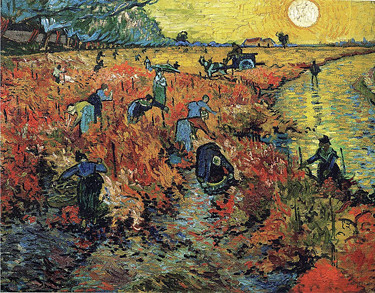
The Red Vineyards near Arles is an oil painting by the Dutch painter Vincent van Gogh, executed on a privately primed Toile de 30 piece of burlap in early November 1888. It is reported to be the only piece sold by the artist while he was alive. Savhanna Herndon
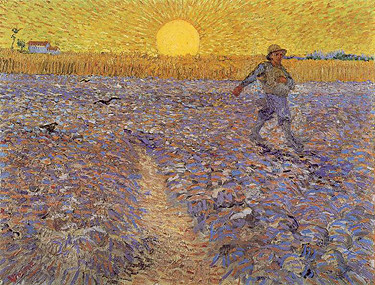
“I don’t hide from you that I don’t detest the countryside — having been brought up there, snatches of memories from past times, yearnings for that infinite of which the Sower, the sheaf, are the symbols, still enchant me as before.” (Letter 628 to his friend and painter Émile Bernard, on or about June 19, 1888).
Vincent Van Gogh, Le semeur (The Sower), Mid-June 1888. Oil on canvas, 64 x 80,5 cm. Kröller-Müller Museum,The Netherlands

Blue Spruce in Snow. Photo by Bob Kirchman
A Case for Vision
© 2019 The Kirchman Studio.
So why do nations fail? While a case can be made for institutional integrity, it is also clear that simply transplanting working institutions (such as the U. S. Constitution) into other societies does not necessarily guarantee success. Post-Colonial Africa testifies starkly to this, as do the wreckages of a succession of Socialist Utopia/Dystopias. If better institutions can be constructed, what are they to be made of? Acemoglu and Robinson argue for good institutions, but cannot tell us what the foundations should be. Even those who would argue that the "American" solution is the right one need to confont the reality of America today. America is in Decline. As her leaders saddle her with $17 Trillion in debt, she becomes increasingly weaker as an agent for providing for the basic security of the society. Her leaders are content to entrust our energy production to unfriendly regimes in the Middle-East, our financial and manufacturing security to unfriendly regimes in Asia and our physical security to a despot-heavy United Nations. How did we get to this point? In this conclusion to the series: A Case for Vision, we will look at some possible reasons.
As America grew increasingly secure in its prosperity, it turned its energies increasingly towards a 'consumer mentality.' Note that this is in stark contrast to the earlier mindset that America was to be a blessing to the rest of the world. The drive to send missionaries, provide clean water and cure disease took a back seat to building bigger houses and bigger televisions. Now we could outsource our manufacturing, enjoying more and cheaper goods. No longer would we have to live next to 'dirty' old factories. They could be converted into trendy botiques, lofts and coffee shops. Sadly, those jobs they created went away too! No worry!, everyone can go to college now. The problem is that the Professional sector grows only insofar as it is the supportive branch of the creation of real productivity. No problem. After college you can work/hang out in the trendy coffee shop. Gratification became a larger motivating force than the securing of Faith and Freedom. The Mall and the Multiplex Theater replaced the church and the armory at the center of the commons. Manufacturing centers could be re-purposed as shopping areas too. Religion diminished as a force for living everyday life, becoming an inspirational hour for refreshment rather than a challenge to be lived throughout the week. Hillary Clinton carefully crafted her own description of Religious Freedom to narrowly define it as the 'private practice of Faith.' Her description actually perscribes its exclusion from the public square! [1.]
Next came a sense of 'entitlement.' How else do you explain unmarried Georgetown University student Sandra Fluke DEMANDING that her school, a Faith institution run by the Jesuits, provide HER with recreational contraceptives? [2.] That she was invited to speak at the Democrat Convention and now is exploring a run for Congress speaks volumes to this new sense of 'entitlement!' There is something fundamentally wrong here... far more than the economic reality that she, as a law student, can anticipate far more income than I will ever see. She does not NEED Georgetown University to provide her with recreational contraceptives. The real travesty is that while the church is being told that it has no place in the commons, those in the commons are all to eager to place such limitations and demands on the house of Faith! A major retailer, a major furniture manufacturer and a chicken sandwich restaurant who seek to live their faith in the marketplace are all under attack. This is not an accident. The inclination of mankind towards morality has been repackaged in electric cars, cloth grocery bags and tilting at the windmill of 'Global Warming.' Stewardship of the earth, a noble thing in and of itself, can attain the status of civil Religion. Traditional Religion can get out of the way of our pursuit of Hedonism. Why should we cry out to G-d if we can make government our provider?
Finally, there is a wrongly placed national pride. This is the arrogant assertion that we somehow no longer need to rely on Divine Providence, humbly petitioning Heaven for our daily bread. We can do it all ourselves if we somehow correctly organize the commons. Thus we eschew the functions of Faith and Defense rightly performed in the commons as the commons takes upon itself to do the work of G-d! But what is the result? May I suggest it is nothing but a high-tech serfdom. Because 'we' can change the climate, we will do so by strangling the very engines of industry and ingenuity that have actually improved man's stewardship of the world (actually we've simply placed our manufacturing offshore. Our 'clean' Priuses receiving toxic batteries from a Chinese factory that would not meet the standards of our own EPA). [3.] We come to the conclusion that 'we' must alone end Acquired Immune Deficiency and balance the temperature of the planet. We will pay carbon taxes to despot regimes while stifling the energy production that will free us to advance to the next generation of propulsion! We forget the wisdom of Samuel Morse, who telegraphed: "What hath G-d Wrought?" upon the successful operation of the telegraph. We forget humility.
And yet, if you are reading this, you might realize that we might indeed pursue a better course. We might look to Bless future generations rather than feather our own nests. We might pursue our science with humble faith as opposed to arrogance, looking to a G-d who I believe is all too eager to reveal new secrets to trustworthy men and women. We might, as we realize the roots of our prosperity, seek to share those roots with our fellow man. We will not kick against Constitutions that limit institutions, seeing that the limitless resource of Divine Revelation can indeed fuel our aspirations. What drew me to Asmus and Gruden's work was their optimism in presenting a universally implementable strategy for improving the human condition. What compelled me to write this series was the burning sense that I was holding in my hands a map, if you will, showing the location of treasure far greater than the Count of Monte Cristo's map to the lost treasure of Sparta. Like the old priest, I want to press it into the hands of someone who will use it for good.
Unplanned Movie Opens
Based on the true story of Abby Johnson, this film tells the story of how she rose to become the youngest director of a Planned Parenthood clinic and then she actually saw what goes on in the ‘procedure rooms.’ Asked to assist in the actual procedure, Johnson saw the tiny baby struggle to get away from the abortionist’s tool on the ultrasound screen. The film tells of this life-changing moment. Thinking she was pursuing a career to ‘help women,’ Johnson was not only disturbed by the disregard for the unborn but also by the abortion industry’s full-out ‘marketing’ of abortion while claiming they wanted to make it rare. In fact, her supervisor explains that abortion services are the profit center for the clinics. They pay for the red Miata and the Lamborghini (along with the generous 401K).
Jack Dorsey of Twitter suspended the @UnplannedMovie promotion run by Lila Rose of 4o Days for Life. Other media outlets refused advertising for the film outright. The MPA slapped an ‘R’ rating on the film, which though it shows some blood, is far more restrained than some PG-13 offerings. The media cabal wanted it to go away. It opened to people who went to see it in droves anyway.
There is an important lesson here. Media outlets can become non-benevolent “gate keepers” and thus render the internet (and any other source, for that matter) a “less than complete” source for people wanting to know the truth. The problem is not a new one, but for younger people who “do everything on their phone” it begs the argument for deeper sources, more thoughtful dialogue and the sharing of ideas in other places. We can talk about the hard issues in church and in person to person interaction. We can learn to go to the source and think for ourselves. That is how you conquer the problems that vex society.[1.]
Ashley Bratcher's Story
[click to read]
I've always considered myself pro-life but certainly not an activist. I had no idea who Abby Johnson was when I first auditioned to play her in the biopic “Unplanned.” I was given just six pages. Six pages that ignited my curiosity. There was something about Abby that stuck with me. How could this incredibly passionate woman one day change her mind about everything she believed in? There had to be more to the story. (read more)
Eugenics Then and Now
[click to read]
Once in the history of our Commonwealth our health system promoted a public policy that promised to deliver advancements in the betterment of the human race. In Staunton, Virginia it was promoted by the director of Western State Hospital, Joseph Spencer DeJarnette (September 29, 1866 – September 3, 1957). As the director of the mental hospital located in Staunton, Virginia from 1905 to November 15, 1943 he was a vocal proponent of racial segregation and eugenics, specifically, the compulsory sterilization of the mentally ill. He was considered a pillar of the community and Adolph Hitler greatly admired his work. Today we shudder at the thought of the forced sterilizations that took place under Dr. DeJarnett’s directorship. The practice only ended in the 1970s. (read more)

Spring Crocus. Photo by Bob Kirchman.

Spring 2019 Areopagus Lecture
They taught me longing - Sehnsucht; made me for good or ill, and before I was six years old, a votary of the Blue Flower.”
— C. S. Lewis, Surprised by Joy
We are pleased to announce that theologian Alison Milbank will be presenting the next Areopagus Lecture. Dr. Milbank’s talk will address the formation of the imagination as part of the vocation of the Church. Alison Milbank was a guest on the MARS HILL AUDIO Journal on Volume 99 when she talked about her book Chesterton and Tolkien as Theologians. She is a professor in the department of theology and religious studies at the University of Nottingham.
Christian apologetics is often understood as a rational defense of belief presented to unbelievers on grounds other than faith. As John Milbank has put it in his forward to Imaginative Apologetics, these grounds reside “on one’s opponent’s territory, where one risks remaining in a weak or even a false position.” In other words, reasons and rationality are understood in terms already inclined to make belief in transcendence less plausible. What if, however, the “apology” offered remained intact and faithful to its original setting? What if the defense of truth relied on the conditions of goodness and beauty?
The famous apologist and fantasy writer, C. S. Lewis wrote that “reason is the natural organ of truth; but imagination is the organ of meaning. Imagination, producing new metaphors or revivifying old, is not the cause of truth, but its condition.” In other statements and in his poem “Reason,” Lewis suggests that not only are reason and imagination distinct from each other, but that they are opposed and that we experience this opposition internally as in irreconcilable tension. How is it that such a superb writer of imaginative fiction seems to maintain a contradictory view of imagination in his non-fiction? Are we to take Lewis’s more direct statements about the imagination literally? Or can the imagination — and Lewis’s admitted love for beauty and longing — be incorporated into our understanding of reason and rationality?
In her talk, Alison Milbank will investigate these questions in light of the transcendentals of truth, goodness, and beauty. With the help of some other thoughtful observers on the role of the imagination, Milbank will examine whether the Church can adopt an imaginative apologetic that does not deny the claims of reason.
When: April 4 at 7:30 PM
Where: The Haven - 112 West Market Street, Charlottesville, VA 29902
What: “Imaginative Apologetics beyond C. S. Lewis”
— Lecture: free and open to the public
RSVP: Please register here [click to register] for the lecture

Labels:
Apollonius,
Art,
DeJarnette,
Eugenics,
Northam,
Unplanned
Wednesday, March 20, 2019
Dietrich von Hildebrand, Hitler's Worst Enemy
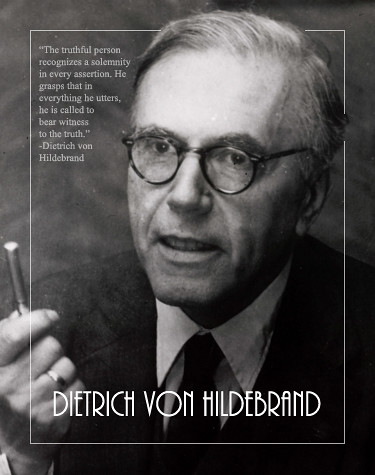
Volume XV, Issue XI
Adolph Hitler's Worst Enemy
Dietrich von Hildebrand (1889-1977), born in Florence, was the son of renowned German sculptor Adolf von Hildebrand. A leading student of the philosophers Edmund Husserl and Max Scheler, he took up the “great questions” – about truth, freedom, conscience, community, love, beauty – with a freshness that allowed him to break new ground, especially in ethics, but also in epistemology, social philosophy, and aesthetics. His conversion to Catholicism in 1914 was the decisive turning point of his life and the impetus for important religious works. His opposition to Hitler and Nazism was so outspoken that he was forced to flee Germany in 1933, and later across Europe, finally settling in New York City in 1940, where he taught at Fordham University until 1960. He was the author of dozens of books, both in German and English. He was a major forerunner of Vatican II through his seminal writings on marriage, on Christian philosophy, and on the evil of anti-Semitism.” – The Hildebrand Project [1.]
To have the wickedest man of the Twentieth Century label you his worst enemy has to be a signature honor. As the publisher of an anti-NAZI publication in Austria Dietrich von Hildebrand indeed found himself under Hitler’s scrutiny. Hildebrand was a great defender of the reality of objective truth. He also reminded us of the place of the objectively beautiful in describing Faith.
Dietrich von Hildebrand
[click to read]
The Forgotten Voice
He was a rare kind of philosopher: he was not just a thinker who aimed at formulating truth — he was also a witness who testified to the truth. Let me explain what I mean by giving you some background to his Vienna years. Von Hildebrand was aware of National Socialism from the time of its first appearance on the German scene. He must have been a well-known opponent of it already in 1923, for in that year, when Hitler tried to seize power in Bavaria, von Hildebrand's name was on a short list of enemies of National Socialism who were marked for execution. He left Germany for good in March of 1933, just days after Hitler had taken office. He moved to Vienna and founded an anti-Nazi journal. He must have made his voice heard, for in 1937 the German ambassador to Austria, van Papen, denounced von Hildebrand to Hitler as the intellectual leader in Austria of the opponents of German National Socialism, and in fact suggested eliminating von Hildebrand and his collaborators. Von Hildebrand stood his ground until Hitler entered Vienna in 1938. For over four years he lived in constant danger of assassination as he bore witness in the pages of his journal. (read more)
Dietrich von Hildebrand
[click to read]
In His Own Words
I was born in Florence on October 12, 1889, the son of the famous German sculptor Adolf von Hildebrand, and his wife, Irene Schaueffelen. My parents lived in a beautiful house, a former convent of the Fratres Minimi, situated on the outskirts of the marvelous town of Florence. I grew up in these glorious surroundings, sheltered in the superabundant love of my mother, and of my five sisters, all rarely gifted personalities. Everything was pervaded by the genius of my father who was, not only great as an artist, but also as a personality. My youth was one of the happiest one can imagine. (read more)
To whom will the sublime beauty of a sunset or a Ninth Symphony of Beethoven reveal itself, but to him who approaches it reverently and unlocks his heart to it? To whom will the mystery that lies in life and manifests itself in every plant reveal itself in its full splendor, but to him who contemplates it reverently? But he who sees in it only a means of subsistence or of earning money, that is, something that can be used or employed, will not discover the meaning, structure, and significance of the world in its beauty and hidden dignity.” ― Dietrich von Hildebrand, The Art of Living
The great mystery of our metaphysical situation, that God is nearer to us than we are ourselves, is manifest in the fact that we cannot even be wholly ourselves—in the sense of individuality as a unique divine thought—until we are reborn in Christ.” ― Dietrich von Hildebrand, Transformation in Christ
Love is not concerned with a person’s accomplishments, it is a response to a person’s being: This is why a typical word of love is to say: I love you, because you are as you are.” ― Dietrich von Hildebrand, The Art of Living
For, just as love embodies the life of all virtues and expresses the inmost substance of all holiness, humility is the precondition and basic presupposition for the genuineness, the beauty, and the truth of all virtue.” ― Dietrich von Hildebrand, Humility: Wellspring of Virtue
Humility involves the full knowledge of our status as creatures, a clear consciousness of having received everything we have from God.” ― Dietrich von Hildebrand, Humility: Wellspring of Virtue
Happiness is love’s outcome, never its motive. Where someone is loved he is an end in himself and certainly not a means toward something else. It is therefore of love’s essence, wherever it is found, that the loved one seem precious, beautiful, and worthy of love.” ― Dietrich von Hildebrand, Man, Woman, and the Meaning of Love: God's Plan for Love, Marriage, Intimacy, and the Family
Love alone brings a human being to full awareness of personal existence. For it is in love alone that man finds room enough to be what he is.” ― Dietrich von Hildebrand, Man, Woman, and the Meaning of Love: God's Plan for Love, Marriage, Intimacy, and the Family
Better to be a beggar in freedom than to be forced into compromises against my conscience. —” ― Dietrich von Hildebrand, My Battle Against Hitler: Faith, Truth, and Defiance in the Shadow of the Third Reich
The soldier of Christ is obligated to fight against sin and error. His battle against the Antichrist is prompted by his loved for Christ, and for the salvation of souls. He fights this battle for the salvation of those who have gone astray. His attitude is one of true love. But those who flee from the inevitable battle, and treat irenically those who have gone astray, obfuscating their error and playing down their revolt against God, are, fundamentally, victims of egoism and complacency.” ― Dietrich von Hildebrand
Anti-Semitism was clearly not just anti-Christian and immoral but also quite foolish.” ― Dietrich von Hildebrand, My Battle Against Hitler: Faith, Truth, and Defiance in the Shadow of the Third Reich
There were a host of people who viewed my rejection of National Socialism as exaggerated and who perceived my sharp tone as un-Austrian. Even many Austrians whose political views were relatively good found my stance too abrupt and not in keeping with Austrian sensibilities.” ― Dietrich von Hildebrand, My Battle Against Hitler: Faith, Truth, and Defiance in the Shadow of the Third Reich
The more our life is permeated by God, the simpler it becomes. This simplicity is defined by the inward unity which our life assumes because we no longer seek for any but one end: God.” ― Dietrich von Hildebrand, Transformation In Christ
The Problem of Original Zinn
[click to read]
Howard Zinn’s One Sided View of History
Who is the most influential historian in America? Could it be Pulitzer Prize winners Arthur Schlesinger, Jr. or Joseph Ellis or David McCullough, whose scholarly works have reached a broad literary public? The answer is none of the above. The accolade belongs instead to the unreconstructed, anti-American Marxist Howard Zinn, whose cartoon anti-history of the United States is still selling 128,000 copies a year twenty years after its original publication. Many of those copies are assigned readings for courses in colleges and high schools taught by leftist disciples of their radical mentor.” – Daniel J. Flynn. Howard Zinn, widely hailed as a ‘historian’ once stated “Objectivity is impossible, and it is also undesirable. That is, if it were possible it would be undesirable, because if you have any kind of a social aim, if you think history should serve society in some way; should serve the progress of the human race; should serve justice in some way, then it requires that you make your selection on the basis of what you think will advance causes of humanity.” And so it goes that millions of young minds are being selectively fed Zinn’s view of history which highlights the sins of our great nation while largely ignoring her noble beginnings and aspirations. History according to Zinn must serve a “a social aim” other than the preservation or interpretation of a historical record. A People’s History of the United States, Howard Zinn’s 776 page book attempts to do just that. (read more)
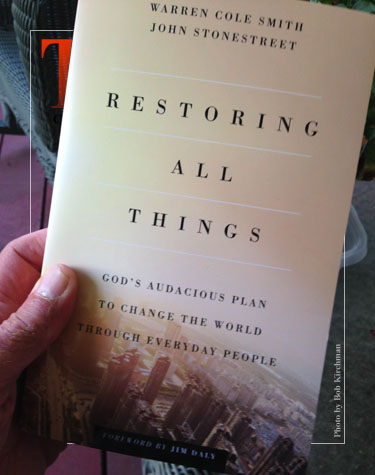
Restoring all Things.
G-d's Audacious Plan
to Change the World
Through Ordinary People
The only two things that can satisfy the soul are a person and a story; and even a story must be about a person. Men... are much oftener led by their hearts than by their understandings." -- G. K. Chesterton
Modern Evangelical Christians often miss the power of the story" -- Warren Cole Smith and John Stonestreet
After I had completed the manuscript for 'Pontifus, the Bridge Builder's Tale in Three Parts,' I discovered Restoring All Things by Warren Cole Smith and John Stonestreet. It was as if these two scholars had seen my feeble attempt to bring redemption into a contemporary (albeit slightly futuristic) narrative. They see the dark and hopeless narrative of the culture and counter it with stories of hope and heroism by quite ordinary people.
The language of the Church often seems like a foreign tongue to those in contemporary culture. Indeed, in the afterglow of great revivals, Christian thought was present in the culture. One would know some Biblical wisdom as part of the narrative. Today the Church is speaking into a culture that has relegated Christian ideas and ideals to a place outside the discussion. The authors note how C. S. Lewis: "...had the challenge of building the bridge between the culture of Oxford and Cambridge and the culture of the Church. These cultures were worlds apart by his time."
Lewis was 'bilingual,' so to speak, understanding the language of the Church as well as the language of the academy. He was able to present a world unseen to those in the secular academy. He and his fellow 'Inkling,' J. R. R. Tolkien opened new vistas to mankind in the Twentieth Century. I am eternally grateful to them.
But the real beauty of this little book is that it is NOT merely a catalyst for intellectual discussion, but a call to action. Smith and Stonestreet show how Christians, ORDINARY Christians, ministered to those in their own communities. It was Christians who cared for their neighbors during plagues. History is full of the stories of the Church meeting human needs. The Saints of the past lay out a pattern for compassion today!
It is the Church that will continue to make the case for the value of all lives... making the case that if we want to protect children from abuse, we will protect them in the womb as well. The authors quote the oft repeated statistic that divorce rates are about the same for Christians as for Non-Christians and dig deeper, finding a significant difference for those who actually adhere to Scriptural authority. The oft quoted statistic includes ANYONE who merely identifies as a Christian. The reality is where Scriptural principles are the benchmark, there is significantly LESS divorce.
In fact, the Church can do the world a great service by 'Giving Marriage to the World Once Again.' Indeed, a world that has cheapened and discarded the institution simply needs to see more of the lovely thing it was created to be.
My favorite chapter is: 'Coloring Outside the Lines,' and it describes how Christians have cherished learning and innovation through history. The Church can provide meaning, purpose and foundations for the acquiring of knowledge. Though we often associate Christian curriculum today with notions such as: "color the grass green, the tree trunk brown..." the truth is that the Church historically has led in education, even establishing the great universities.
Today the Church must reengage in G-d's work to Remake the world. Smith and Stonestreet provide the workbook; and illustrate it profusely with stories of ordinary people doing just that.

Morality without G-d?
'Moral Atheism', A Conundrum
Suppose I should stumble upon a beautiful house in the woods. Is the architect merely a device I conjure to explain how post and beam arranged themselves over billions of years?" Such an argument would seem foolish to most, yet that is essentially the argument that occurred as NPR interviewed Phil Zuckerman, professor of sociology and secular studies at Pitzer College. The titles of his books tell you where he is coming from; “Living the Secular Life: New Answers to Old Questions,” “Faith No More” and “Society Without God.” The argument is essentially this: As more and more Americans seem to be turning away from G-d, the fact that most of us still believe in the Golden Rule... is some morality simply built into us as a species? [2.]
Barbara J. King writes: "In a book called The Bonobo and the Atheist, primatologist Frans de Waal argues that morality is built into our species. Rather than coming to us top-down from God, or any other external source, morality for de Waal springs bottom-up from our emotions and our day-to-day social interactions, which themselves evolved from foundations in animal societies.
For 30 years, de Waal has authored books about apes and monkey that open our eyes to the bottom-up origins of our human behaviors, ranging from politics to empathy. In this, his 10th volume, he extends that perspective by writing, "It wasn't G-d who introduced us to morality; rather, it was the other way around. G-d was put into place to help us live the way we felt we ought to." [3.]
And so, is this some great new revelation. Is Faith now rendered obsolete because morality is indeed visible outside of its boundaries? If 'evolution' gave us our morality programmed in, who's the PROGRAMMER? Much like the idea life on earth seeded by space aliens, one must simply ask: "How did THAT life come to be?
But is the house of Faith caught speechless? Centuries ago the Apostle Paul wrote these lines, which squarely address the matter:
For I am not ashamed of the gospel of Christ: for it is the power of G-d unto salvation to every one that believeth; to the Jew first, and also to the Greek. For therein is the righteousness of God revealed from faith to faith: as it is written, The just shall live by faith. For the wrath of G-d is revealed from heaven against all ungodliness and unrighteousness of men, who hold the truth in unrighteousness; Because that which may be known of G-d is manifest in them; for G-d hath shewed it unto them. For the invisible things of Him from the creation of the world are clearly seen, being understood by the things that are made, even his eternal power and G-dhead; so that they are without excuse: Because that, when they knew G-d, they glorified him not as G-d, neither were thankful; but became vain in their imaginations, and their foolish heart was darkened. Professing themselves to be wise, they became fools, And changed the glory of the uncorruptible G-d into an image made like to corruptible man, and to birds, and fourfooted beasts, and creeping things.
Wherefore G-d also gave them up to uncleanness through the lusts of their own hearts, to dishonour their own bodies between themselves: Who changed the truth of G-d into a lie, and worshipped and served the creature more than the Creator, who is blessed for ever. Amen. For this cause G-d gave them up unto vile affections: for even their women did change the natural use into that which is against nature: And likewise also the men, leaving the natural use of the woman, burned in their lust one toward another; men with men working that which is unseemly, and receiving in themselves that recompence of their error which was meet.
And even as they did not like to retain G-d in their knowledge, G-d gave them over to a reprobate mind, to do those things which are not convenient; Being filled with all unrighteousness, fornication, wickedness, covetousness, maliciousness; full of envy, murder, debate, deceit, malignity; whisperers, Backbiters, haters of G-d, despiteful, proud, boasters, inventors of evil things, disobedient to parents, Without understanding, covenantbreakers, without natural affection, implacable, unmerciful: Who knowing the judgment of G-d, that they which commit such things are worthy of death, not only do the same, but have pleasure in them that do them." -- Romans 1:16-32 KJV
Evident in the "new" morality apart from G-d there is indeed at least a surface compassion, yet the push to marginalize Divine texts as a source for moral instruction has led to a 'civil morality' that must redefine marriage and personhood to incorporate non-traditional marriage and consequence-free sexual expression (through the employment of abortion). Those who would ask that we consider the rights of the unborn or the rights of conscience of those who adhere to traditional definitions are indeed excoriated as the 'heretics' of the new moral state.
Nowhere is this more evident than the academy. Lutheran college student Bethany Woelmer writes: "As college students, we swim in a sea of worldly lies and deceptions, whose roaring waves bring fear and doubt upon our consciences and whose subtle currents attempt to carry us farther from the truth. We swim in a culture that redefines marriage, misinterprets G-d’s Word and promotes intolerance against the fundamental reality of family and its blessing to society and the Church. Yet there is a wave of truth, that is, G-d’s Word, that transcends the wisdom of man, and it brought hundreds of college students to the Taboo conference in St. Louis, Jan. 5-7, to answer questions that many of us encounter today." [4.] The campus ministry conference addressed, as its name suggests, many topics the new atheists wish Christians would not. Woelmer's Report [click to read] on the conference is worth reading.
Ironically, Woelmer points out a great problem. While atheists may insist that 'family values' are 'programmed in,' so to speak; their philosophies actually are at odds with the preservation of family. Intellectuals like Sam Harris say things like: "If I could wave a magic wand and get rid of either rape or religion, I would not hesitate to get rid of religion." Thinkers like Harris and Richard Dawkins see religion as a greater evil than truly defined evils. Citing the 'reasonableness' of science (it always invites free inquiry, right)?, they engage in an all-out attack on Faith as they seek to create a 'reasonable' society.
But is science really dogma-free? Consider the matter of "Global Warming." Even as the East Anglia emails [4.] showed climate scientists were forming the data to fit their desired narrative, the 'scientific community' continued to brand skeptics of the theory as 'heretics.' Popular culture fanned the flames through spokespersons such as Leo DiCaprio, who's passion for the narrative verges on fanaticism. Removing Divine Revelation from the discussion of morality has not resulted in a world without dogma. In fact, it has resulted in a new dogma, based on the sketchy evidence of computer models. Humans are "destroying the planet." "Zero Population Growth" and carbon credits are the new law to be delivered from the mount, not of Sinai, but of 'science.'
Casting aside the wonder of Imago Dei, the wonderful concept found in Genesis that man is created in the image of G-d, we are now seen by 'reasonable' men as nothing special. The theological implications are staggering. Man is just another species with no special place and if his presence unsettles the planet, reduce the population. In a profound irony, Self Actualization, as described by Abraham Maslow, becomes all-important in this new G-dless world.
Therefore, in the muddy new world of G-dless 'morality,' if I love the unborn I may be branded as a hater for denying someone the 'right' to kill her unborn child. Yet it is the Inspired Writings that tell us to love our enemies and bless those who persecute us. It is the Christians who rescued unwanted babies who were cast into the Tiber River. There is a level of sacrifice that is unnatural, that goes far beyond sacrificial protection of our young. Consider the actions of the 'Righteous Gentiles' during the Holocaust. Consider the great stories, the stories of heroism and sacrifice. I do not feel you can dismiss them as simply 'programmed in.' [6.]
Lee Strobel offers More Evidence [click to read] of the work of the Divine.

Subscribe to:
Comments (Atom)
